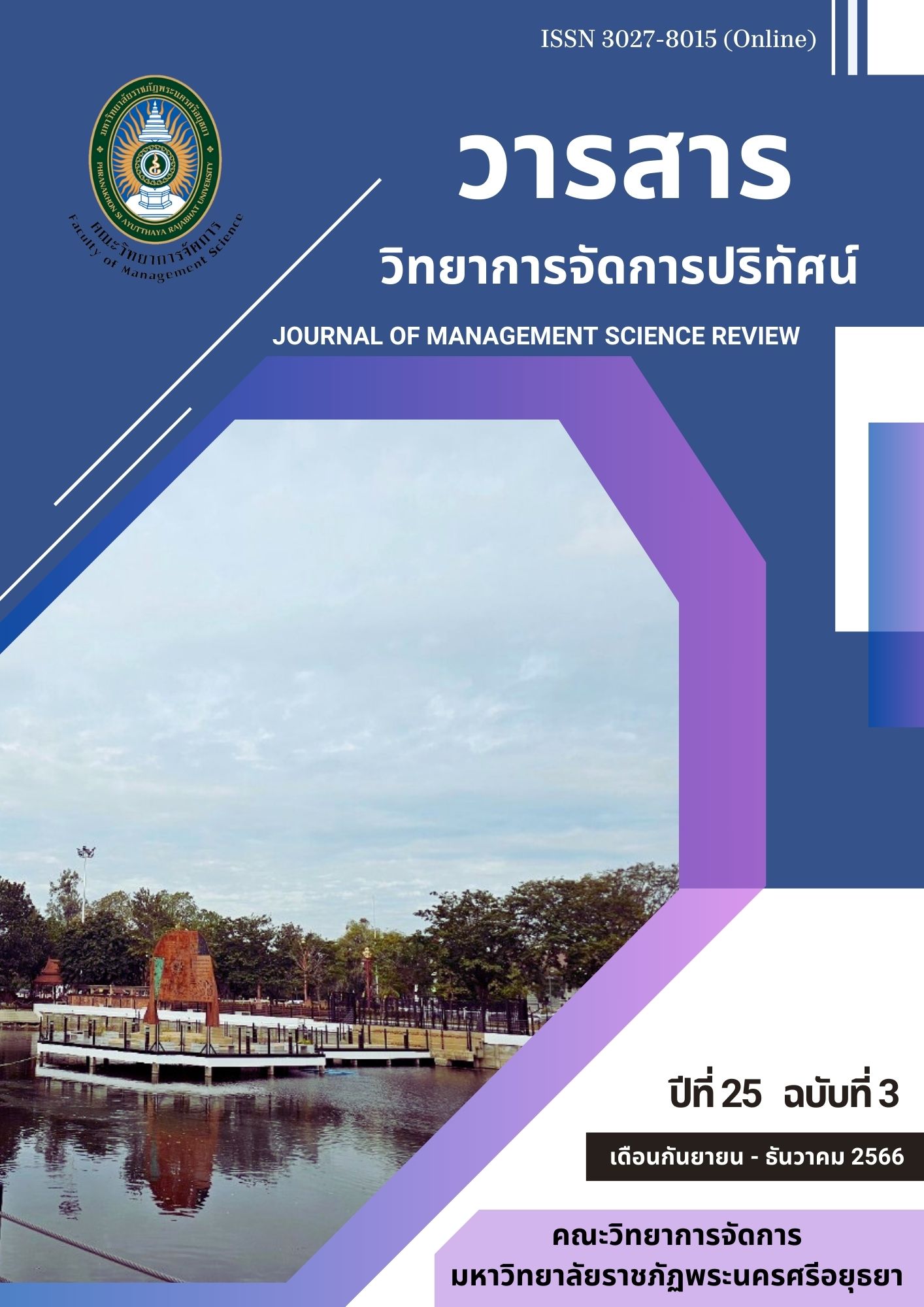อิทธิพลของการสร้างรูปแบบในการทำงานที่ส่งผลต่อการปฏิบัติงานของพนักงานเทคโนโลยีสารสนเทศบริษัทเอกชน ในเขตกรุงเทพมหานคร
คำสำคัญ:
การสร้างรูปแบบในการทำงาน, ความผูกพันในงาน, ความมุ่งมั่นทุ่มเทในการทำงาน, ความคิดสร้างสรรค์, ผลการปฏิบัติงานของพนักงานบทคัดย่อ
การวิจัยมีวัตถุประสงค์เพื่อ 1) ทดสอบการสร้างรูปแบบในการทำงาน ความผูกพันในงาน ความมุ่งมั่นทุ่มเทในการทำงาน ความคิดสร้างสรรค์ของพนักงานที่ส่งผลต่อผลการปฏิบัติงาน 2) ทดสอบการสร้างรูปแบบในการทำงานที่ส่งผลต่อความผูกพันในงาน ความมุ่งมั่นทุ่มเทในการทำงาน ความคิดสร้างสรรค์ของพนักงาน 3) ศึกษาความผูกพันในงาน ความมุ่งมั่นทุ่มเทในการทำงาน ความคิดสร้างสรรค์ของพนักงานที่เป็นตัวแปรส่งผ่านความสัมพันธ์ระหว่างการสร้างรูปแบบ และผลการปฏิบัติงาน งานวิจัยนี้เป็นวิจัยเชิงปริมาณ มีเครื่องมือวิจัยคือแบบสอบถาม และกลุ่มตัวอย่างคือพนักงานด้านเทคโนโลยีสารสนเทศในบริษัทเอกชนเขตกรุงเทพมหานคร จำนวน 380 ราย มีการวิเคราะห์ด้วยสถิติแบบจําลองสมการโครงสร้างโดยนําผลที่ได้จากวิธีเชิงปริมาณมาสรุปเป็นแบบจําลองทางสถิติ ผลการวิจัยพบว่า การตรวจสอบข้อมูลเชิงประจักษ์โดยมีค่าดัชนีความกลมกลืนดังนี้ CMIN/df = 2.113, GFI = 0.917, CFI = 0.971, RMR = 0.030, RMSEA = 0.054, RMR = 0.047 ผลการทดสอบสมมติฐาน มีการยอมรับสมมติฐานทั้ง 8 ข้อ โดยการสร้างรูปแบบในการทำงาน ความผูกพันในงาน ความมุ่งมั่นทุ่มเทในการทำงาน ความคิดสร้างสรรค์ของพนักงานมีความสัมพันธ์ในเชิงบวกกับผลปฏิบัติงานของพนักงาน ทั้งนี้ ผู้บริหาร และฝ่ายทรัพยากรมนุษย์ในองค์กรสามารถนำผลการวิจัยไปเป็นแนวทางการสร้างแรงจูงใจและความมุ่งมั่นทุ่มเทในงานให้กับพนักงานเพื่อเป็นการเพิ่มผลการปฏิบัติงานของพนักงานในองค์กร
เอกสารอ้างอิง
Armstrong, M. (2010). Armstrong's handbook of reward Management practice: Improving performance through reward. Kogan Page Publishers.
Berg, J. M., Dutton, J. E., & Wrzesniewski, A. (2013). Job crafting and meaningful work. In B. J. Dik, Z. S.
Byrne, & M. F. Steger (Eds.), Purpose and meaning in the workplace (pp. 81–104).
https://doi.org/10.1037/14183-005
Chen, P., Lee, F., & Lim, S. (2020). Loving thy work: Developing a measure of work passion. European
Journal of Work and Organizational Psychology, 29(1), 140-158.
Chong, E., & Ma, X. (2010). The influence of individual factors, supervision and work environment on
creative self‐efficacy. Creativity and Innovation Management, 19(3), 233-247.
Cronbach, L. J. (1951). Coefficient alpha and the internal structure of tests. Psychometrika, 16(3), 297-
Ebrahimi, E. (2021). The Relationship between Living a Calling and Job Crafting: The Moderating Role of
Job Passion. Transformation Management Journal, 12(2), 1-20.
Fernández-del-Río, E., Koopmans, L., Ramos-Villagrasa, P. J., & Barrada, J. R. (2019). Assessing job
performance using brief self-report scales: The case of the individual work performance questionnaire. Revista de Psicología del Trabajo y de las Organizaciones, 35(3), 195-205.
Fornell, C. & Larcker, D.F. (1981). Evaluating Structural Equation Models with Unobservable Variables
and Measurement Error. Journal of Marketing Research, 18(1), 39-50.
Hair, J.F., Black, W.C., Babin, B.J., & Anderson, R.E. (2010). Multivariate Data Analysis. 7th Ed..
New York: Pearson.
Ince, H., Imamoglu, S. Z., & Turkcan, H. (2022). Relationships among absorptive capacity, creativity and
job performance: the moderating role of social media usage. Management Decision, 60(3), 858-882.
Kline, R. B. (2011). Principles and practice of structural equation modeling. 3rd ed. New York: Guilford.
Leiter, M. P., & Bakker, A. B. (2010). Work engagement: introduction. Work engagement: A handbook of
essential theory and research, 1(9).
Li, J. B., Leung, I. T. Y., & Li, Z. (2021). The pathways from self-control at school to performance at work
among novice kindergarten teachers: The mediation of work engagement and work stress. Children and youth services review, 121.
Li, N., & Ding, M. (2022). The Influence of Paradoxical Leadership on Adaptive Performance of New-
Generation Employees in the Post-Pandemic Era: The Role of Harmonious Work Passion and Core Self-Evaluation. Sustainability, 14(21).
McAllister, C. P., Hochwarter, W. A., Harris, J. N., Perrewé, P. L., & Ferris, G. R. (2017). A multi-sample
constructive replication of perceived resource availability’s role in work passion–job outcomes relationships. Journal of Business and Psychology, 32, 147-164.
Moon, T. W., Youn, N., Hur, W. M., & Kim, K. M. (2020). Does employees’ spirituality enhance job
performance? The mediating roles of intrinsic motivation and job crafting. Current Psychology, 39, 1618-1634.
Motowildo, S. J., Borman, W. C., & Schmit, M. J. (1997). A theory of individual differences in task and
contextual performance. Human performance, 10(2), 71-83.
National Statistical Office. (2021). The people working in the Information and Communication
Technology 2021. from http://www.nso.go.th/sites/2014/DocLib1/2564/ict_worker_64.pdf
Nguyen, H. M., Nguyen, C., Ngo, T. T., & Nguyen, L. V. (2019). The effects of job crafting on work
engagement and work performance: A study of Vietnamese commercial banks. The Journal of Asian Finance, Economics and Business, 6(2), 189-201.
Nykolaiszyn, J. M. (2022). The impact of job crafting and work engagement on academic librarians before
and during the COVID-19 pandemic. The Journal of Academic Librarianship, 49(3), 102697.
Petrović, I. B., Vukelić, M., & Čizmić, S. (2017). Work engagement in Serbia Psychometric properties of
the Serbian version of the Utrecht Work Engagement Scale (UWES). Frontiers in psychology, 8, 1799.
Pitafi, A. H., Khan, A. N., Khan, N. A., & Ren, M. (2020). Using enterprise social media to investigate the
effect of workplace conflict on employee creativity. Telematics and Informatics, 55.
Vallerand, R. J. (2015). The psychology of passion: A dualistic model. Series in Positive Psychology.
Saleem, S. T., & Adeel, A. (2016). Strategic human resource management and employee creativity: The
role of leadership style and knowledge management capacity. In Information and Knowledge Management, 6(6), 53-69.
Schaufeli, W. B., Bakker, A. B., & Salanova, M. (2006). The measurement of work engagement with a
short questionnaire: A cross-national study. Educational and psychological measurement, 66(4), 701-716.
Siddiqi, H., & Qureshi, M. (2016). The impact of employees’ creativity on the performance of the firm.
Research issues in social sciences, 1(1), 1-16.
Wang, Y., & Lau, D. C. (2022). How and why job crafting influences creative performance? A resource
allocation explanation of the curvilinear moderated relations. Asia Pacific Journal of Management, 39(4), 1561-1587.
Zhang, M., Wang, F., & Das, A. K. (2020). Work–family conflict on sustainable creative performance: Job
crafting as a mediator. Sustainability, 12(19).





